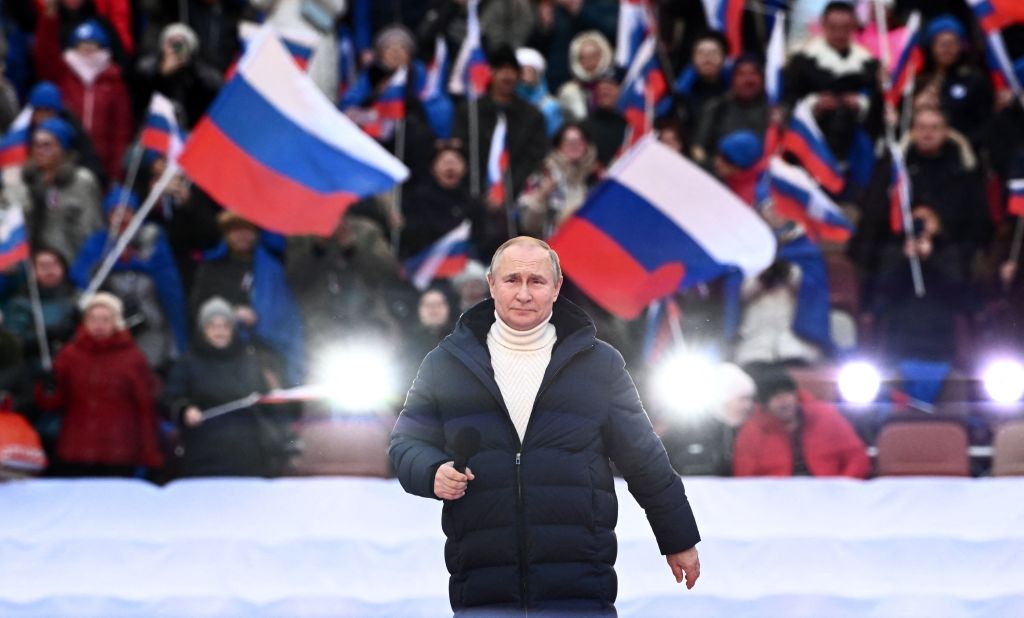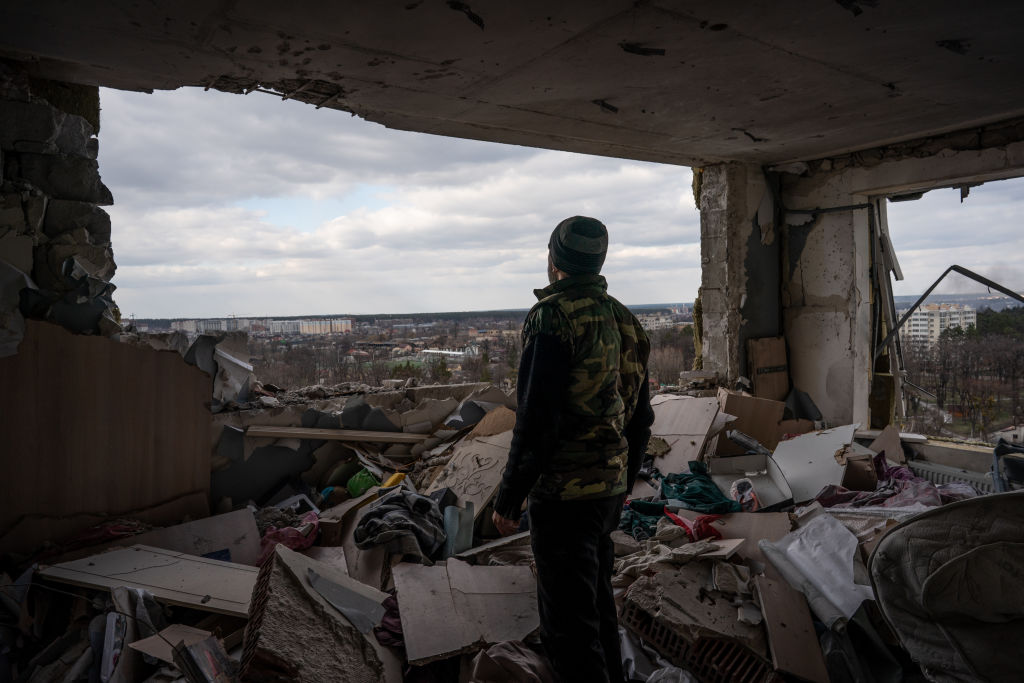
Hrytsak is a Ukrainian historian and a professor at the Ukrainian Catholic University
As a Ukrainian historian, I have many contacts with historians in Russia, for the histories of our countries are interconnected. I also know many Austrian, American, Israeli, German, Polish, and other historians who study our history. Since the beginning of the war, they have been writing to me, inquiring whether my family and my students were safe, and offering help.
Now guess: how many of those who reached out to me were Russian?
In fact, only two—a married couple, who left Russia long before the war began as they faced the threat of being termed “agents of foreign influence.”
I have a friend who is a professor of theoretical physics. The very same thing happened to him: since the beginning of the war, the only Russian colleagues who reached out to him have been those who left Russia.
I understand that history is about politics. Since war is a continuation of politics by other means, my fellow historians in Russia might consider me their enemy. Theoretical physics, however, has nothing to do with politics.
There is something in Russian culture today making most Russians—even highly educated people—incapable of simple manifestations of human solidarity.
In a recent interview on Ukrainian television, Viktor Shenderovich, a Russian critic of Putin who escaped to Israel, urged us not to judge all Russians too harshly, as they are nothing but hostages. And it is not right to blame hostages.
If this is true, it is only partially so. The whole truth is that Russians surrendered and became hostages voluntarily. Before Putin came to power in 2000, opinion polls in Russia showed that most Russians were ready to trade freedom for order, were openly hostile to the West, and dreamed of a strong hand—primarily of a military force that would be respected and feared by the world.
More from TIME
In other words, behind the real Vladimir Putin stands the collective Putin of the Russian people. Moreover, Putin is not just collective—he is repetitive. Over the past two hundred years, Russia has gone through several periods of liberalization. Each of these periods was followed by another of repression. Suffice it to say that Putin came to power after the reforms of Gorbachev and Yeltsin.
Historians call this phenomenon the Russian pendulum. Due to its swings, Russia never managed to form a society of citizens. Russians remain largely a community of subjects with low public trust and solidarity. If they lack these when it comes to their own relations, why should they show solidarity with their neighbors?
Read More: What It Will Take for Ukraine to Win the War
Ukrainians’ past and present give them a special insight into Russian history. Even during periods of democratization, the Russian authority view of the Ukrainian question was not amicable. The Ukrainian language was officially banned twice during the liberal reforms of Alexander II. Gorbachev claimed that Ukrainians themselves did not want their children to learn Ukrainian.
Russian oppositionists believe that the essence of Russia does not lie in its “brainless leaders” but in Bulgakov, Akhmatova, Mandelshtam, Brodsky and other geniuses of Russian culture. Their legacy is everlasting, and in a way, they are the real Russia.
That might be so. It’s just that it doesn’t make much of a difference for Ukrainians, not then and especially not today. Many of Russia’s brightest minds seem to suffer from a Ukrainian complex as well.
Examples abound. Here is the most recent one: a poem by Joseph Brodsky, the Nobel Prize winner, written on the occasion of Ukraine’s declaration of independence in 1991:
God rest ye merry [Ukrainian] Cossacks, hetmans, and gulag guards!
But mark: when it’s your turn to be dragged to graveyards,
You’ll whisper and wheeze, your deathbed mattress a-pushing,
Not Shevchenko’s bullshit but poetry lines from Pushkin
(translated by Sergey Armeyskov; Taras Shevchenko (1814 – 1861) and Aleksandr Pushkin (1799 – 1837), were, respectively, the greatest Ukrainian and Russian national poets)
I can just see the inhabitants of Mariupol whispering the lines of Pushkin while dying under Russian bombardment!

At the heart of this attitude towards Ukrainians is the sense of “how wonderful it is to be Russian.” In the minds of many Russians, Russia is not just another country. It is a country with a great mission—namely, to save the world from the corrupting influence of the spoiled West. For this reason, all things Russian must be great: its territory, its army, even its language has to be (as one Russian genius put it) “great and mighty.” Neighboring nations who reject this great mission are, at best, silly children in need of education, at worst, scoundrels and traitors who must be decimated, deported, and so on. In either case, they cannot be left to their own devices to sort out their own happiness.
It seems that buried deep behind Russian megalomania is an inferiority complex. Russians cannot fathom how, after emerging victorious over Napoleon and Hitler, they are now living worse than the French and the Germans. Similar to Aesop’s fable of the fox and the grapes, the constant failure to “catch up and overtake the West” pushes many to conclude that “the West” is not for them. Russia is no country, but a separate Civilization, to which “Western rules” do not therefore apply. Accordingly, many Russians are prepared to suffer privations themselves or inflict equal suffering on their neighbors, if it proves Russia’s greatness to the world.
Read More: Ukrainians Blame Russians for the Invasion
For all the talk of the mysterious Russian soul, the truth is quite simple. Russians can fight well (although their present war puts even that in serious question). They may achieve short-term economic breakthroughs as part of late Imperial or Stalinist modernization. However, they never managed to effect a political modernization, i. e., to limit central power, separate church and state, create independent courts, ensure safeguards for the opposition, protect the citizenry from violence.
The Russian question is hardly exceptional. It is parallel with German, Polish, Jewish, and other issues of European politics. All of them have been solved, often by bloody conflicts and untold suffering. But in the end these nations managed to create their own countries with functional democracy, and with relative economic well-being. Now it is the Ukrainians’ turn. After thirty years of wandering in circles, exhausted by the corruption of their elites, they’re as close as they’ve ever been to completing the political modernization of their country. They do not wish to be part of a passive community with delusions of grandeur—they are fighting for their right to live in a normal society.
It is just that, as the case of the Marshall Plan tells us, even postwar Europe, with its longstanding democratic traditions, had a hard time dealing with its problems. No country can “do their homework” without external assistance.
Ukraine, too, deserves a Marshall Plan, and will, hopefully, get one. But will a successful resolution of the Ukrainian question also resolve the Russian one? Even once Russia loses a war, and Putin steps down or dies, what’s to stop the Russian pendulum from swinging the other way again, following another liberalization.
In my humble opinion, the Russian question can be resolved by mirroring Putin’s plans toward Ukraine. He demanded “denazification” of Ukraine—well, Russia will have to undergo “de-Russification.” That is, it must abandon its ambitions of becoming a “Greater Russia” and become a normal country. But above all Russia has to do what Ukrainians are doing: hold political reforms, after which no Putin, individual, collective, or repetitive, is possible. Russia would have to do this by itself—but with outside support, or even outside supervision, in exchange for the lifting of sanctions.
If those who call for understanding Russia truly want this, they should look beyond superficial impressions. The Russian question is deeply rooted in the past. Therefore it requires strategic solutions, not tactical ones. Otherwise, we risk doing a great disservice not only to Russia and its neighbors, but to the entire world.
More Must-Reads from TIME
- Cybersecurity Experts Are Sounding the Alarm on DOGE
- Meet the 2025 Women of the Year
- The Harsh Truth About Disability Inclusion
- Why Do More Young Adults Have Cancer?
- Colman Domingo Leads With Radical Love
- How to Get Better at Doing Things Alone
- Michelle Zauner Stares Down the Darkness
Contact us at letters@time.com